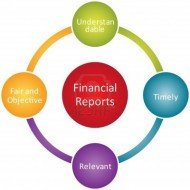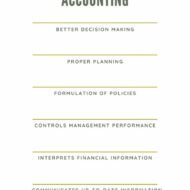Posted by Managementguru in Accounting, Management Accounting
on Feb 14th, 2014 | 0 comments

Advantages of Management Accounting It helps to increase the efficiency of all functions of management.It helps in target-fixing, decision-making, price-fixing, selection of product-mix and so onForecasting and Budgeting help the concern to plan the future and financial activities.Various tools and techniques provide reliability and authenticity to carry out the business functions.It is useful in controlling wastage and defects.It helps in complete communication between all levels of management.It helps in controlling the cost of production thus increasing the profit percentage.It is proactive-analyses the governmental policies and socio-economic scenario which helps to assess the external environmental impacts on the organization. Limitations of Management Accounting It is concerned with financial and cost accounting. If these records are not reliable, it will affect the effectiveness of management accounting.Decisions taken by the management accountant may or may not be executed by the management..It is very expensive. Only big concerns can adopt this method of accounting.New rules and regulations are to be framed, hence there is a possibility of opposition from the employees.It is only in the developing stage.It provides only data and not decisions.It is a tool to the management and not an alternative of management. These are the advantages and limitations of management accounting. Characteristics of management accounting Following are the characteristic features of management accounting: First and foremost characteristic is that it provides the necessary information to the management. It might be any data- numbers, gross profit, net profit, comaparitive financial statements, profit and loss account etc.,It is purely analytical.The interpretations help the management in timely decision-making.It adopts a selective technique to arrive at the results.Helps to chart-out the future course of action.Also helps to know the present financial condition of the firm and the respective implications on the stake holders. Various tools of management accounting: MARGINAL COSTINGSTANDARD COSTINGBUDGETARY CONTROLRATIO ANALYSISFUND FLOW ANALYSISCASH FLOW ANALYSIS...

Posted by Managementguru in Accounting, Management Accounting
on Feb 14th, 2014 | 0 comments

The basic objective of management accounting is to assist the management in performing its functions effectively. The functions of the management are planning, organizing, directing and controlling. What is Management Accounting? Management accounting also is known as managerial accounting and can be defined as a process of providing financial information and resources to the managers in decision making. Management accounting helps in the performance of each of these functions in the following ways: Provides data: Management accounting serves as an important source of data for management planning. The accounts and documents are a store-house of a vast quantity of data about the past progress of the enterprise, facilitating forecasts for the future. Modifies data: The accounting data required for managerial decisions is properly collected and classified. For example, purchase figures for different months may be classified to know total purchases made during each period product-wise, supplier-wise and territory-wise. Analyses and interprets data: The accounting data is probed meaningfully for effective planning and decision-making. For this purpose the data is presented in a comparative form. Ratios are calculated and likely trends are projected. Serves as a means of communication: Management accounting provides a means of communicating management plans upward, downward and outward through the organization. Initially, it means identifying the feasibility and consistency of the various segments of the plan. At later stages it keeps all parties informed about the plans that have been agreed upon and their roles in these plans. Facilitates control: Management accounting helps in translating given objectives and strategy into specified goals for attainment by a specified time and secures effective accomplishment of these goals in an efficient manner. All this is made possible through budgetary control and standard costing which is an integral part of management accounting. Uses qualitative information: Management accounting does not restrict itself to financial data for helping the management in decision making but also uses such information which may not be capable of being measured in monetary terms. Such information may be collected form special surveys, statistical compilations, engineering records, etc. Take the Quiz and Check Your Accounting IQ! 1. The financial statement that reports the revenues and expenses for a period of time such as a year or a month is the Balance Sheet Income Statement Statement Of Cash Flows 2. The financial statement that reports the assets, liabilities, and stockholders’ (owner’s) equity at a specific date is the Balance Sheet Income Statement Statement Of Cash Flows 3. Under the accrual basis of accounting, revenues are reported in the accounting period when the Cash Is Received Service Or Goods Have Been Delivered 4. Under the accrual basis of accounting, expenses are reported in the accounting period when the Cash Is Paid Expense Matches The Revenues Or Is Used Up 5. Revenues minus expenses equals __________ 6. Resources owned by a company (such as cash, accounts receivable, vehicles) are reported on the balance sheet and are referred to as __________ 7. Assets are usually reported on the balance sheet at which amount? Cost Current Market Value Expected Selling Price 8. Obligations (amounts owed) are reported on the balance sheet and are referred to as __________ 9. Liabilities often have the word __________ in their account title. 10. Unearned Revenues is what type of account? Asset Liability Stockholders’ (Owner’s) Equity Scroll Down to Know the Right Answers: ↓ ↓ ↓ ↓ ↓ 1. Income Statement 2, Balance Sheet 3. Service or Goods have been delivered 4. Expense matches the revenue or is used up 5. Net income 6. Assets 7. Cost 8. Liabilities 9. Payable 10. Liability Here are some very resourceful online courses on accounting from udemy – Give it a try: 1. Accounting & Financial Statement...




